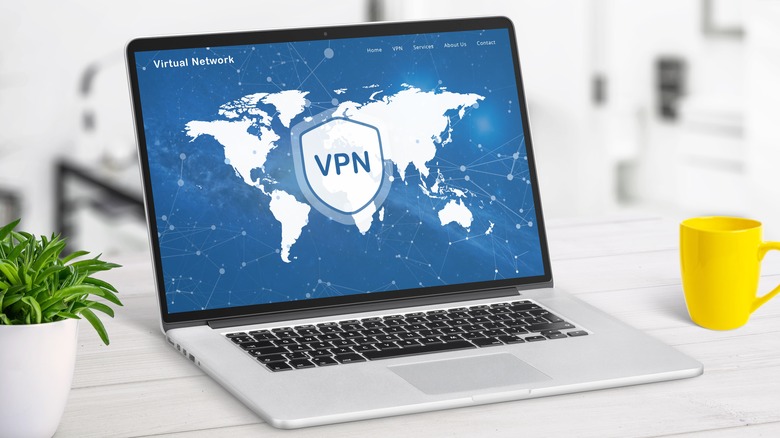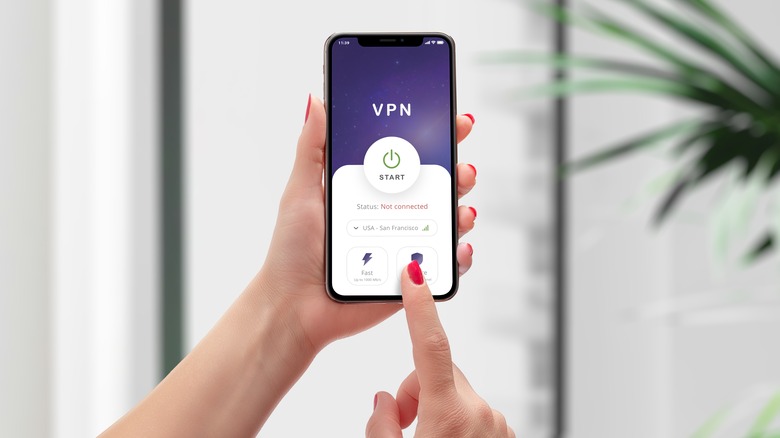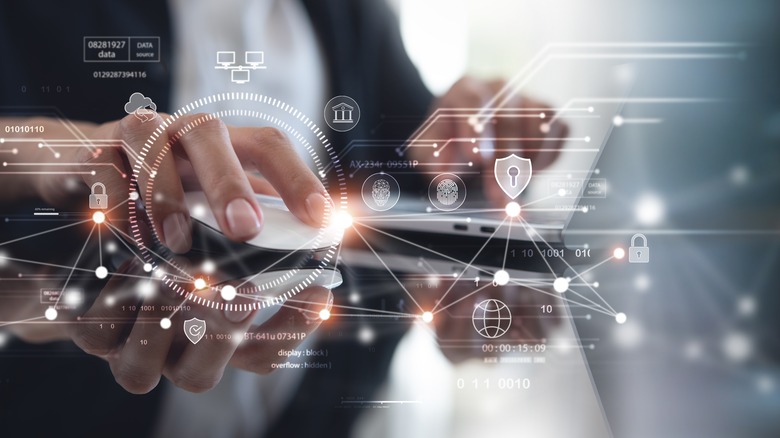What Does VPN Stand For And Does It Actually Keep You Safe?
You've probably heard about VPNs. You may have already used one before to stream shows from a different geolocation or hide your ISP when you're using public internet in a coffee shop or airport lounge. But what do the initials "VPN" actually stand for, and what does it mean?
VPN stands for "Virtual Private Network." A network is a group of connected devices, including computers, which can communicate, share resources, or transfer data. The internet is a network but so too is a home Wi-Fi setup linking your phone, computer, and doorbell.
While many networks — including the internet itself — are public, private networks confine access to particular users or devices. The first private networks were used in business settings and used hardware like dedicated cables. VPNs are "virtual" because they create a simulated, software-based connection instead of a physical connection. A VPN, therefore, enables you to create a private connection over a public network hiding your IP address and making it appear that your online activity originates from the VPN server rather than your actual location.
Does a VPN actually keep you safe?
VPNs are not perfect. Whether a VPN will keep you safe will depend on two main factors: the level of security you need from it and the VPN service provider you use. VPNs shield your browsing activity from internet service providers (ISPs), but those same ISPs may simply block VPNs instead. Advertisers, web browsers, and operating systems are still finding ways to collect your data.
If you're using a VPN in order to hide your activity from government surveillance and censorship, then the level of security you need is a lot greater than someone who just wants to avoid having their data sold to marketing companies. Several countries, including China, Russia, and Iran have banned the use of unauthorized VPNs and only allow Government-approved alternatives, which are subject to censorship or surveillance. In most cases, your ISP can see that you're using a VPN by monitoring how much data is being used. If you're in a country where using a VPN — regardless of what you're using it for — is illegal, then it may not be providing the safety you need.
The level of safety you can expect also depends on the VPN provider that you use. By using a VPN, you are entrusting your security to a third party and relying on assurances that they won't log and resell your information. Some VPN providers — especially those offering a free connection — may be harvesting your data and selling it on.
How can you make your internet activity safer?
A VPN can provide a certain level of safety, but it won't protect you from malware, phishing attacks, or other forms of cybercrime. You need to be circumspect about what websites you engage with and avoid downloading files that might be malicious.
A VPN does not make you completely anonymous. While it can hide your IP address and encrypt your searches, other factors like cookies and social media activity can still expose your identity. There are also tracking techniques — known as browser fingerprinting — that collect information about your device, browser settings, and configuration to create a unique user profile that can identify you even without cookies. VPNs are most effective when used in combination with other security practices, such as strong passwords, antivirus software, and safe browsing habits.
You should ensure that your VPN includes a kill switch so that if the connection drops, the internet is automatically disabled. This stops your IP address and sensitive information from being exposed if there is an issue with the VPN.
What are the alternatives to VPNs?
Tor is a free, decentralized network that routes internet traffic through multiple encrypted relays operated by volunteers. This provides anonymity by hiding your IP address and traffic patterns. It's often used for accessing the dark web or bypassing censorship. However, it is slower than VPN due to multiple relays and unsuitable for bandwidth-heavy activities like streaming.
Mixnets are designed to obscure communication patterns by breaking down data into smaller packets, mixing them with other users' data, and routing them through multiple nodes. It works by shuffling and delaying messages, making it nearly impossible to link senders with receivers.
You can also use a decentralized VPN (dVPN), which is similar to a traditional VPN but operates on a "peer-to-peer" network. Users share bandwidth and act as nodes in the system.
Whatever method you use, remember that both the technology to secure data and the technology to intercept that data are evolving all the time. If your internet safety is paramount to you, you need to keep abreast of all the most recent developments.



